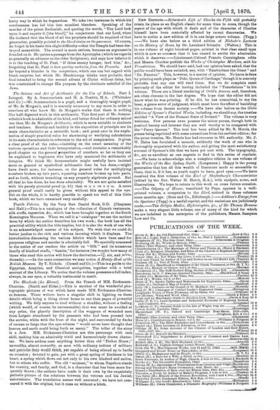The Blockade (Le Blocus). From the French of MM. Erckmann-
Chatrian. (Smith and Elder.)—This is another of the wonderful pho- tographic pictures of war which have made MM. Erckmann-Chatrian so famous. These writers have a singular skill in lighting on those details which bring a thing closer home to one than pages of powerful writing. We defy anyone to read without a shudder, without a feeling (which would, of course, be unreasonable) that war must be avoided at any price, the ghastly description of the waggons of wounded men from Leipsic abandoned by the peasants who had been pressed into the service, white with the frost of the night, and surrounded by flocks of ravens so large that the eye-witness " would never have thought that heaven and earth could bring forth so many." The teller of the story is a Jew. MM. Erckmann-Chatrian use this personage with rare skill, making him an admirably vivid and harmoniously drawn charac- ter. We have seldom seen anything better than old "Father Moses ;" tumorlike, almost cowardly, as men with ordinary notions of military and patriotic duty would think, yet capable of being stirred up to battle on occasion ; devoted to gain, yet with a great spring of kindness in his heart, a spring which flows out not only to his own kindred and nation, but to others who suffer. The old " serjeant," to whom Napoleon stands for country, and family, and God, is a character that has been more fre- quently drawn ; the authors have made it their own by the exquisitely pathetic picture of the relations between the veteran and his Jewish entertainers. The translation seems well executed ; we have not corn- 'oared it with the original, but it runs on without a hitch.


































 Previous page
Previous page